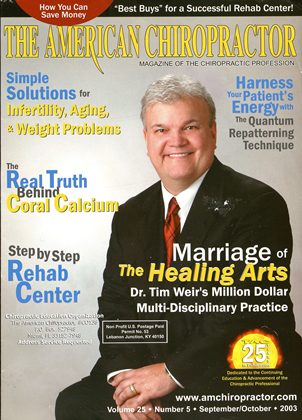P atient compliance is an issue for all doctors. And, let's face it, when we feel well, we often cheat on our exercise or diet plans. After all, we are only human. This short article provides some great ammunition to motivate us—and our patients—to follow-through with good nutritional practices. Recently Dr. Bruce Ames, a famous toxi-cologist from the University of California at Berkeley, explained that nutrient needs vary with age and genetic constitution, and supplementation with micronutrients and metabolites would tune up metabolism and give a marked increase in health, particularly for the poor and elderly.1 Consider that 80% of children and adolescents and 68% of adults do not eat the recommended total of five portions of fruits and vegetables per day, which I think is low anyway. Ames points out that such habits are known to promote cancer and other degenerative diseases. We chiropractors have warned our patients about such issues for many years, and now it is becoming a much more popular perspective to have. How serious are such deficiencies? Consider telling your patients the following information that was written by Ames, a leading researcher in the field. It is now known that deficiencies in key nutrients will mimic the damage that occurs to cells when they are exposed to radiation. That's right; micronutrient deficiencies and radiation damage have similar affects on cells. Ames focuses on vitamins B-12, B-6, niacin, C and E, and the minerals iron and zinc. Evidence suggests that at least half the US population is deficient in at least one of these micronutrients. Tell your patients to be smart and take at least a multi. The only way you will discover if you have a subclinical deficiency is when you get cancer or some other serious degenerative disease. Not a good thing to happen if you plan on living a long life. There is no need to place oneself at risk for cancer, heart disease, other degenera tive diseases, infertility, obesity, and premature aging. Give yourself a nutritional adjustment and drop the inflammatory grains, replacing them with fruits and veg etables. If you want a starch, have a potato. Also, make sure to take a multi, magne sium, perhaps calcium, fish oil, and coenzyme Q10. These represent easy ways to prevent chronic disease from developing, and give every body a chance to live longer and healthier lives. EH See page 59 for References Dr. Seaman is the Clinical Chiropractic Consultant for Anabolic Laboratories, one of the first supplement manufacturers to service the chiropractic profession. He is on the faculty of Palmer College of Chiropractic Florida am! on the postgraduate faculties of several other chiropractic colleges, providing nutrition seminars that focus on the needs of the chiropractic patient. Dr. Seaman believes that chiropractors should be thinking like chiropractors, while providing nutritional recommendations. Doctors and patients who follow his programs report improved feelings of well-being, weight loss, dramatic increases in energy, and significant pain reduction. Dr. Seaman can be reached by e-mail at Infertility? This may also be driven by deficiencies. In a recent study, twenty-four subfertile men took a daily supplement that contained both 66 mg. of zinc and 5 mg. of folic acid for twenty-six weeks and experienced a 74% increase in total normal sperm count. Consider the countless millions of dollars that could be saved on fertiliy drugs if people would just take a multiple vitamin. Need to drop a few pounds? Ames and his group believe that micronutrient deficiencies drive obesity. This is because energy-rich, but nutrient-poor, diets will create a state that drives us to eat more to obtain adequate nutrients. In other words, the overweight and obese are constantly hungry, because they are deficient in key nutrients. Aging too quickly? Our mitochondria make free radicals when they make ATP (adenosine triphosphate) for cell energy. Free radicals can damage tissue and cause premature aging. What should you do? Ames and his group have worked with lipoic acid and acetyl carnitine and found that they reduce free radi- cals and as I discussed in a previous issue of The American Chiropractor (Vol ume 25, Issue I).2 Magnesium is also important for mitochondria function, so make sure to get enough magnesium and consider supplementing with 400-1000 mg. per day. ,...-,
 View Full Issue
View Full Issue






